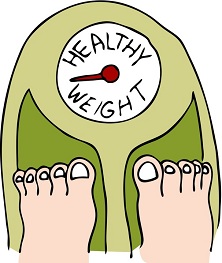 From Your Health Journal…..”Another great article from The Guardian out of the UK written by Charlotte Cooper entitled There’s no need for this obesity epidemic hysteria. There have been many opinions here over the last month about weight and health. Some reports have stated that being slightly overweight may be healthier for you, while other reports have been stating the opposite, that reaching your ‘normal weight’ is your actual goal. My response has always been, what is someone’s normal weight? One person’s weight for their size may be perfect for them, while another person the same height may require a significantly different weight for optimal health. In many cases, we rely on the BMI (Body Mass Index) to see if our weight is healthy. But, it comes with controversy, as it does not always take into account lean body mass or muscle mass, as well as water weight. I still do feel obesity is an issue in the United States, as well as other parts of the world, and many people do need a lifestyle change to help get them on a path to better health. Yes, for those who may be slightly overweight, you most likely do not have as much to worry about. But, for those who are severely overweight or obese, you do need to be very careful about heart disease, and other chronic illnesses due to weight gain like type 2 diabetes, cancers, and weak joints. Please take the time to visit The Guardian web site (link provided below) to read the complete article. I enjoyed the author’s view on obesity, and think you will as well.”
From Your Health Journal…..”Another great article from The Guardian out of the UK written by Charlotte Cooper entitled There’s no need for this obesity epidemic hysteria. There have been many opinions here over the last month about weight and health. Some reports have stated that being slightly overweight may be healthier for you, while other reports have been stating the opposite, that reaching your ‘normal weight’ is your actual goal. My response has always been, what is someone’s normal weight? One person’s weight for their size may be perfect for them, while another person the same height may require a significantly different weight for optimal health. In many cases, we rely on the BMI (Body Mass Index) to see if our weight is healthy. But, it comes with controversy, as it does not always take into account lean body mass or muscle mass, as well as water weight. I still do feel obesity is an issue in the United States, as well as other parts of the world, and many people do need a lifestyle change to help get them on a path to better health. Yes, for those who may be slightly overweight, you most likely do not have as much to worry about. But, for those who are severely overweight or obese, you do need to be very careful about heart disease, and other chronic illnesses due to weight gain like type 2 diabetes, cancers, and weak joints. Please take the time to visit The Guardian web site (link provided below) to read the complete article. I enjoyed the author’s view on obesity, and think you will as well.”
From the article…..
Forty years of fat activism has shown that people with high body weights can stay healthy without dieting
Another day, another urgent report by a prestigious body of health professionals demanding that something be done about obesity. It is, they say, a medical emergency: the sky is falling in. Forgive my cynicism but, since the grandpappy of reports such as this was published by the World Health Organisation in 2000, this Henny Penny approach to fat people’s health has dominated the debate. It is no surprise that one of the most popular divisions in fat studies, an emerging academic field, is dedicated to deconstructing the hyperbolic rhetoric of obesity epidemiology.
The Academy of Medical Royal Colleges report treads familiar ground. Its recommendations range from the sensible and inoffensive – such as improving hospitals’ nutritional standards, or limiting fast food outlets – to the hateful and harmful. The AoMRC encourages NHS staff to pester patients about their weight in every encounter, but what fat person in their right mind would go to the doctor with a verruca, or a funny rash that might just reveal a life-threatening illness, if they know they’ll get a right old finger-wagging?
The calls for expanding bariatric surgery, meanwhile, are chilling. One Pennsylvania study found that people who had this surgery died at a younger age than those who did not, and there were 440 deaths in all, after 16,683 procedures. Other reports suggest that the mortality rate is lower, but complications from surgery, including hernias, infection, pneumonia, gall-bladder failure, and other problems associated with malnutrition are common.
These interventions are ineffective – or worse – because they treat “the obese” as an abstract, pathological population instead of a group of actual people who are part of the social fabric. They consider weight loss to be the ultimate remedy for every health and social problem associated with fatness, even though it is almost impossible to maintain in the long-term for most people, including those who have undergone surgical interventions. What is sad about this is that people tend to blame themselves when weight loss fails.
To read the complete article…..Click here
